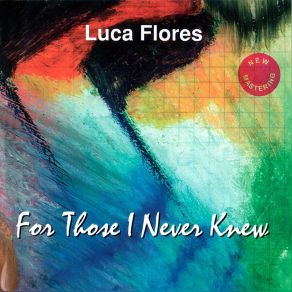For Those I Never Knew
Download links and information about For Those I Never Knew by Luca Flores. This album was released in 1995 and it belongs to Jazz genres. It contains 11 tracks with total duration of 01:00:25 minutes.

|
|
|---|---|
| Artist: | Luca Flores |
| Release date: | 1995 |
| Genre: | Jazz |
| Tracks: | 11 |
| Duration: | 01:00:25 |
| Buy it NOW at: | |
| Buy on iTunes $8.99 | |
Tracks
[Edit]| No. | Title | Length |
|---|---|---|
| 1. | How Far Can You Fly? (Ladder) | 4:29 |
| 2. | Max 2 Supersoul - Max Due Super Soul | 4:19 |
| 3. | My Ideal | 7:10 |
| 4. | Leaving | 6:18 |
| 5. | Musengu (Where Extremes Meet) | 8:16 |
| 6. | Coincidenze | 4:43 |
| 7. | Kaleidoscopic Stars | 4:53 |
| 8. | But Not for Me | 5:33 |
| 9. | Look for the Silver Lining | 3:58 |
| 10. | Cartone Animato | 3:54 |
| 11. | For Those I Never Knew (Patience) | 6:52 |
Details
[Edit]The final album by Italian pianist Luca Flores was recorded a mere ten days before he took his own life in 1995. Its title is a fitting one, in that it is dedicated to all the musicians he played with on his 13 albums, and to those for whom he had worked as a sideman. Many of the compositions here are from his earlier recordings with quintets, trios, and sextets, and most of them are his own compositions. There are a handful of standards here as well, including Jerome Kern's "Look for the Silver Lining" and Gershwin's "But Not for Me," as well as Richard Beirach's "Leaving." But in a sense it doesn't matter who wrote them, because they are all read through Flores' distinctively idiomatic sound, one that is so personal and so full of ciphers, disappearances, and flights of chromatic genius that they are all his anyway in the end. Flores studied the greats: Tatum, Wilson, Evans, Jarrett, etc. But his style and his technique — so obvious from the first moment he lays his hands on the keys in "How Far Can You Fly" and whispers out its signature in the title track that ends the disc — ultimately owe to no one but himself. Flores was one of those lyric stylists for whom everything was melodic, everything graced with its own sense of beauty and mystery, and he approached his entire repertoire that way. The spaced-out arpeggios in "My Ideal," for one, the bluer-than-blue ostinato in "Leaving," and the strident lower-register operatics of "Musengu" all point toward a pianistic genius that to this day goes unheralded, one that listeners will never hear from again. It's criminal that Luca Flores is not appreciated in death; it was even more criminal that he was not properly acknowledged for his true contribution to the piano book's language while he was walking and playing among us. This is one of the most intimate, groundbreaking, and heartbreakingly beautiful solo piano recordings in the jazz canon. Period.